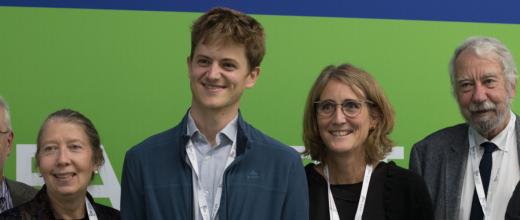23.10.2024
4 minutes of reading
On 16 October, the third IFPEN-ANRT thesis prize was awarded to Jennifer Perrin for her thesis in the field of life and health sciences entitled “Approches d'ingénierie métabolique en levure pour la sécurisation de la production de l'anticancéreux Etoposide en Région Centre-Val de Loire” (Yeast metabolic engineering approaches to secure the production of the anticancer drug Etoposide in the Centre-Val de Loire region), defended on 31 January 2023 at Tours University. This thesis was conducted within the framework of a CIFRE agreement signed with the SME Axyntis. The company, the award winner and her thesis supervisors explain the significance of this research.
Axyntis’ perspective
“Created in 2007, Axyntis is an intermediate-sized company specializing in fine chemistry and dyes. Our research is supported by collaborations with universities based in the Centre-Val de Loire region of central France with the expertise and facilities required for the bioconversion of substances (i.e., the conversion of a simple precursor by yeast), completing our range of tools by going beyond conventional chemical synthesis. More specifically, the aim of this collaboration is to offer an alternative and local source for the production of anticancer precursors, namely Etoposide and Vindoline.
Within the framework of our collaboration with Tours University’s Plant Biomolecules and Biotechnologies laboratory (BBV), we provide our expertise in the field of purification using chromatography for the isolation of precursors from complex plant mixtures, as well as substances of interest from a culture medium obtained after factory cell action. Hence, we isolated a substance that was then used as the raw material for the laboratory’s research.
From this substance, BBV developed and optimized the metabolic engineering part in order to synthesize increasingly complex substances until the target sugar was obtained via glycosylation.
This project has resulted in the forging of strong links between BBV and our company. The collaboration, initiated several years ago, is now being continued within the context of a call for projects of regional interest (APR-IR) and a new CIFRE thesis.
The CIFRE initiative makes it possible to recruit a highly qualified person and collaborate on a project requiring significant research work over a long period of time. It means the project can benefit from the expertise and resources of both entities.
Jennifer Perrin was an invaluable member of our R&D team during the periods she spent at our company. She showed great initiative in carrying out her research, proposing solutions to the many technical challenges encountered and never losing sight of the application aspect of the project.”
Loïc Guillonneau, Innovation R & D Manager.

The prizewinner : Jennifer Perrin
The supervisors’ perspective
Nathalie Giglioli-Guivarc’h, University Professor and director of the Plant Biomolecules and Biotechnologies laboratory, Sébastien Besseau, lecturer at the BBV (Plant Biomolecules and Biotechnologies laboratory) and Vincent Courdavault, University Professor at the BBV laboratory, supervised Jennifer’s research.

| 
| 
|
Can you explain the main challenge of Jennifer’s thesis?
The main challenge of the thesis was to find a way of producing the anti-cancer drug etoposide without using the Himalayan plant Podophyllum hexandrum (also known as the Himalayan Mayapple), which produces the substance naturally. The plant is now widely overexploited to generate the drug and, as a result, is almost on the brink of extinction. The objective of the thesis was to develop an alternative, biotech-based method to produce the substance and thus dispense with the need to use the plant. Accordingly, our approach first consists in identifying the part of the plant’s DNA responsible for producing the substance. These DNA fragments are then transferred to other types of cells, in this case baker’s yeast grown in bioreactors. These yeasts act as bio-converters, making it possible to convert substances extracted from plants that can be grown in France, namely junipers, to produce etoposide. This process makes it possible to relocate the production of certain high added-value substances, such as anticancer drugs, to France This bioconversion process ultimately makes it possible to exploit a plant substance that already exists and is widely available. This therefore avoids the need to produce etoposide via neosynthesis from a precursor directly in yeasts, as is the case with Mayapple, which would require the transfer of a very large quantity of genetic information.
How does this thesis contribute to your laboratory’s research activities?
There’s no doubt that this thesis has been an excellent lever for transferring our expertise and the results of our long-recognized fundamental research to concrete projects that are useful to society. The development of this project to secure the production of drug compounds has also enabled us to reinforce our metabolic engineering expertise and gain wider recognition in the biomanufacturing sector. Lastly, the thesis research and associated results have helped us increase the number of our national and international partners and access projects with a European reach.
How will you remember your time spent working with Jennifer Perrin?
Working with Jennifer was easy, an absolute pleasure and extremely productive. Jennifer was always very committed to her work and her motivation was constant and unfailing throughout the project. What’s more, Jennifer is a very friendly and dynamic person who easily fitted into our team. She also demonstrated a high degree of scientific maturity, enabling her to produce an impressive body of work, in both qualitative and quantitative terms, with multidisciplinary aspects. Recognized on a number of occasions for her public speaking skills, Jennifer always demonstrated pedagogical and didactic qualities in communicating her results, as evidenced by several awards for her oral papers at conferences. She was also the vital bridge between Axyntis and our team, helping to strengthen our ties with the company.
In your view, what are the advantages of the CIFRE initiative?
The CIFRE initiative offers lots of advantages. Working closely with a company can only serve to accelerate the transfer of our discoveries to industry. It also gives a clearer understanding of the issues of concern to industry. When conducting academic research, we have ideas for potential applications but we often lack the industrial viewpoint. We have fostered dialogue based on trust, which enables us to better grasp the issues of industrial scale-up. The additional constraints this imposes are obviously something we don’t have to deal with in the laboratory setting.








